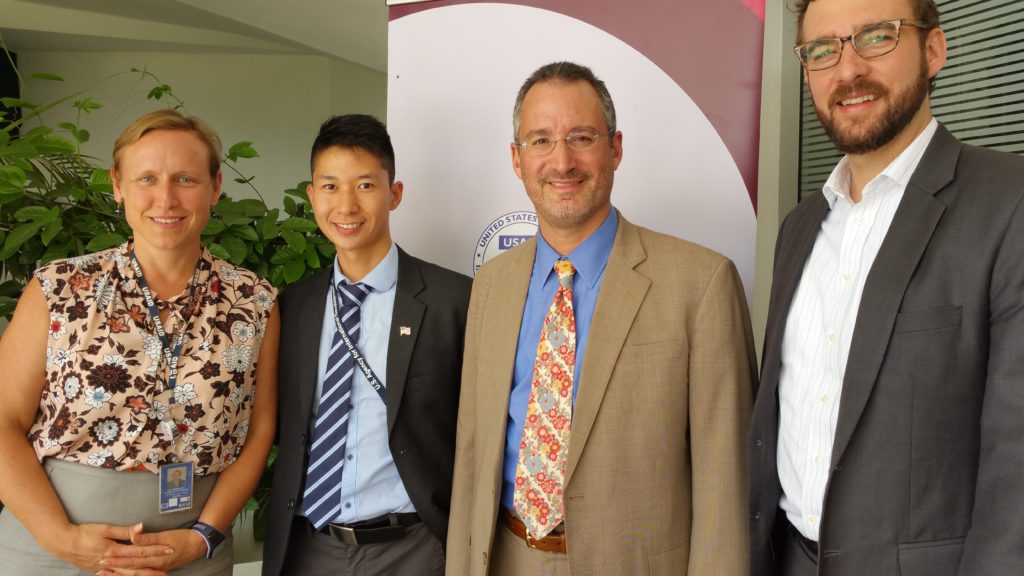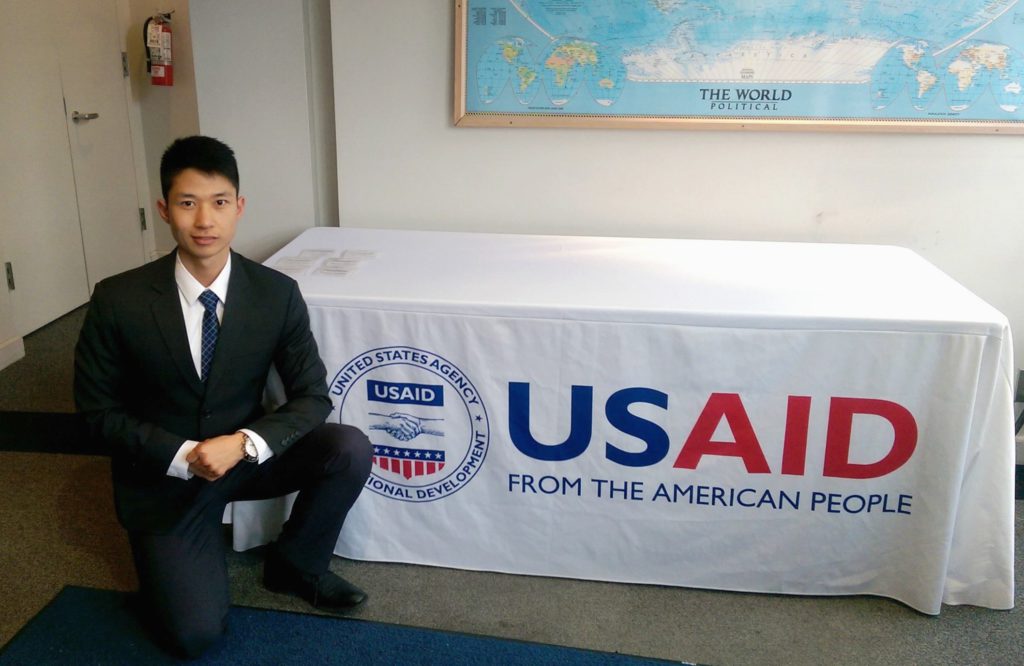
Our guest author Kayden Hoang Bui writes about his experience applying for the USAID Donald M. Payne International Development Fellowship, a competitive 2-year graduate school and professional development fellowship for young leaders interested in a career with the U.S. Foreign Service.
By guest author Kayden Hoang Bui
I first heard about the Foreign Service when I was on the Fulbright English Teaching Assistantship grant in Thailand. A representative from the Embassy came to present one day during our month-long orientation, and I was heavily drawn in by Foreign Service Officers’ ability to travel to a new post every two or three years, the intensive language training, and the responsibility and honor of representing the American people abroad. I had spent a total of three years overseas from 2010 to 2015, and so I also wanted to continue exploring an international career.
Like many others, I assumed that only the U.S. Department of State had Foreign Service Officers (FSOs), but I soon learned that there are six U.S. entities that have them, including the Department of State (which has the largest number of officers), United States Agency for International Development (USAID), Foreign Agricultural Service (FAS), Foreign Commercial Service (FCS), Animal and Plant Health Inspection Service (APHIS), and Broadcasting Board of Governors (BBG).
The USAID Donald M. Payne Fellowship was introduced to me by a student at Columbia University’s School of International and Public Affairs who I contacted for advice while I was applying for graduate school programs. The Payne Fellowship was created to support young professionals interested in pursuing careers in the Foreign Service, and particularly encourages the application of members of minority groups who have historically been underrepresented in international development careers. The fellowship provides benefits valued at up to $93,000 over two years toward a two-year master’s degree. It also includes internships in Washington D.C. and at USAID missions overseas and provides professional development and support.
At first, I was hesitant to apply because the fellowship is highly competitive, but because of the generous financial assistance, career development opportunities, and ability to join the Foreign Service, I decided to put in my best effort.

The Application Process
I dedicated three full months to perfecting my personal statement, priming my recommendation letter writers, and reflecting on my long-term goals.
The application’s deadline was in January and it required a personal statement (600 words), a financial statement (400 words), two recommendation letters, official transcripts, a Student Aid Report from FAFSA, an official financial aid statement from your senior year, and my GRE/GMAT scores. I will note that there are eligibility requirements that are non-negotiable like a minimum 3.20 GPA and U.S. citizenship, and so I would make sure to see if you qualify before starting your application.
After submitting my application, I waited until March or April to receive notification of my finalist status. Soon after, the Payne Fellowship program provided round-trip transportation to Washington, D.C. for a full-day interview consisting of a writing portion, group exercise, and an individual panel interview. Within the next week, I received my fellowship notification. When I applied in 2016, there were 15 finalists for seven spots (while in 2017, there were 25 finalists and ten Fellows). Once you get an interview, your chance of being selected for the fellowship is excellent.
The Fellowship Experience
When you become a Fellow, you will be entered into a very small and tight-knit community who will become your friends and colleagues for the rest of your life. You will travel to Washington, D.C. in May to begin your ten-week internship on Capitol Hill. For my year, we had a one-week USAID and Payne Fellowship orientation where we met with senior management and the Administrator of USAID, as well as participate in professional development sessions and presentations to introduce ourselves to the group.
For the summer internship on the Hill, we were housed on the Howard University campus. My cohort worked at offices in the House of Representatives, House Foreign Affairs Committee, and Congressional Research Service. This was a great time for me to learn about the inner workings of the Hill, learn how bills are introduced and passed in practice, as well as get exposure to life as a staffer. My favorite part of the summer was meeting the Charles B. Rangel International Affairs Fellows (who lived at Howard with us), going to all the different events hosted by different organizations and embassies with the other Payne Fellows, and enjoying free food at events around Washington.

Advice for Prospective Donald M. Payne Fellows
1. Learn about what USAID does abroad and consider how you want to contribute to the mission
USAID works multilaterally and bilaterally with governments, non-profits, and local organizations to deliver services and infrastructure that are essential for developing nations. For example, USAID works on developing educational curriculums, micro-lending, agriculture, land remediation, health systems strengthening, and a host of other projects that look at short-, medium-, and long-term impact. Because of the Agency’s wide reach and variety of sectors that it works in, it will help if you focus your application on some broad topics that most interest you.
2. Explain how your graduate school program will train you to become a better USAID Foreign Service Officer
Many of Fellows are doing technical and professional degrees in public health, urban planning, public policy and diplomacy, development practice, and other fields that are directly related to their future career. I decided to pursue a Master in Public Policy at the Harvard Kennedy School because I wanted to gain quantitative skills in econometrics, cost-benefit analysis, and data analysis, as well as qualitative skills in negotiations, leadership, persuasive writing, and public speaking. I related the courses that I was most interested in back to why it will enhance my ability to succeed in international service with the Agency, and I connected the dots for the selection committee that showed them how my life’s trajectory has led me to this point and how Payne fits into it.
3. Research all of the different Foreign Service backstops and read the job descriptions
USAID has many backstops, or specialties, for junior FSOs including environment; population/health/nutrition; education; crisis, stabilization, and governance; contracting; agriculture; and program analysis/project development. One of the main differences between the Foreign Service for the Department of State and USAID is that they are looking for generalists while we are geared towards more specialized roles. All of the backstops have very specific skillsets, and so it is worth looking at the job descriptions for each of these to see how your undergraduate major, professional experience, and graduate program fulfills the requirements. It is okay if you are not sure which exact one you want to enter since you do not have to choose until you actually join, but have a good idea before applying since it can help you focus your essays and make a cohesive argument for why you are qualified.
4. Reflect on your past and pick stories that contributed to who you are today
Pick one or two personal stories to include in your essays, and keep a couple more for your interview. I was on the reading panel for a small fellowship in my graduate school program, and I would say one of the biggest mistakes that the applicants make is describing how qualified they are without providing examples of the obstacles that they have faced. It is great when applicants have participated in Peace Corps, Fulbright, Critical Language Studies, or Boren fellowships, but the selection committee wants to know what challenges you faced and how you overcame them, or what insights you gained from these opportunities and how you translated them into action. Be vulnerable in the essays because there are over two or three hundred people who apply, and you want your application to be an instant “yes” instead of instantly forgettable.
5. Don’t let yourself be discouraged – there are many opportunities!
When I was applying for the Fulbright, I got rejected. Not once, not twice, but three times. It was as heartbreaking the third time as it was the first time, but somehow, something in me helped me persevere and I am glad that I did not give up so easily. When I did not get accepted, I allowed myself to be sad, but I moved on. I started looking for other opportunities, and it was some of the most transformative years in my young adult life. I met so many people doing different things, following different career paths, and I realized that life exists outside of these scholarships and fellowships. In the end, after my third application and rejection, Fulbright later notified that I could be accepted due to the availability of extra funds. If you are persistent and you learn from your mistakes, I have learned that things will happen if they are meant to happen.
Interested in applying? Bookmark the Donald M. Payne International Development Graduate Fellowship Program to your ProFellow account.
Kayden Hoang Bui graduated cum laude with a B.S. in biology and B.A. in Mandarin Chinese from the University of St. Thomas in St. Paul, Minnesota. He is currently a USAID Donald M. Payne Fellow and Master in Public Policy candidate at Harvard University’s John F. Kennedy School of Government. Hoang was a 2012 Boren Scholar to Taiwan, a 2014-15 Fulbright English Teaching Assistant grantee to Thailand, and will be a Boren Fellow to Thailand in 2017-18.
© Victoria Johnson 2017, all rights reserved.
